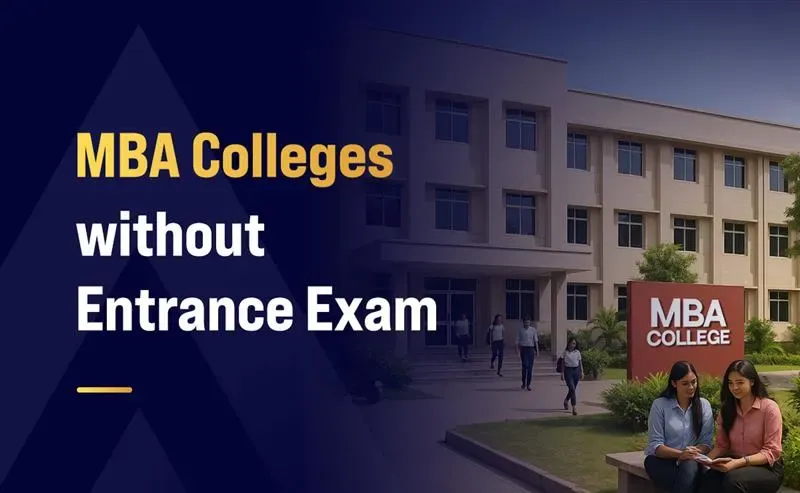Direct Admissions in MBA Colleges without Entrance Exam

Entrance exams are often seen as a gateway to break into reputable MBA programs in the country. Exams such as CAT, XAT, GMAT, and more enable colleges to assess a candidate's readiness for advanced study in management and business administration programs.
Gaining popularity in recent years, direct admission is an alternative path that students explore. Increasingly, several significant institutions in India also offer direct MBA admissions without requiring such entrance exam scores.
This is gaining traction, as it increases the accessibility of a standard MBA program. It also streamlines the route to acquiring the advanced business skills and leadership competencies that the course is known for.
This article explores a list of MBA colleges without entrance exam requirements. It will also dive into eligibility, documentation, admission processes, and benefits of direct MBA admissions in India, along with a list of some of the top colleges offering this option.
If you’re exploring MBA alternatives, Altera’s Post Graduate Program (PGP) offers a practical, career-focused path. Admission is through our own entrance test—ALNAT—which evaluates skills that truly matter for success in the program. With real-world projects, expert mentorship, and strong placement support, the PGP is built to prepare you for today’s competitive job market.
Direct Admission to MBA in India: Eligibility Criteria
To qualify for direct admission to an MBA program in India without an entrance exam, candidates must typically meet specific eligibility criteria set by the respective institutions. Overview of Eligibility Requirements:

- Bachelor's Degree: Applicants are required to possess an undergraduate degree in any field from a recognized university. While most institutions stipulate a minimum aggregate score of 50%, this requirement may differ across colleges.
- Work Experience (if required): While not mandatory for all direct MBA programs, some institutions may prefer candidates with relevant work experience, especially executive MBA courses, which are designed for working professionals or executive MBA courses.
- Alternative Assessments: Candidates must undergo personal interviews (PI), group discussions (GD), or submit a Statement of Purpose (SOP) to assess their skills, motivation, and preparation for the program.
- Management Quota: Some private institutions offer a management quota for direct admission without entrance exams. Candidates applying under this quota must still meet the minimum academic requirements and may go through alternative evaluation processes as outlined above.
- Program-Specific Requirements: Institutions offering direct MBA admission may have additional criteria based on their unique selection process, industry collaborations, or course specialization. Some may emphasize strong undergraduate records, while others may prioritize a blend of academic achievements and personal qualities that align with their program values.
Documents Required for Direct Admission to MBA in India
Candidates must present the following documentation when applying for direct MBA admission:
- Academic transcripts: Graduation certificates and mark sheets demonstrating a minimum aggregate score (typically 50%) in an undergraduate program. Furthermore, certificates from class 10 and 12 marksheets are also required.
- Identification Proof: Applicants must provide valid identification documents, which may include an Aadhar card, passport, or PAN card.
- Character and Conduct Certificates: Some institutions may request a character or conduct certificate from past educational institutions or workplaces.
- Work Experience Certificates: For candidates applying to programs that consider work experience, relevant experience letters or certificates are essential.
- Photographs: Passport-sized photos for identification and official use.
- Statement of Purpose (SOP): A written statement is needed, outlining the applicant’s motivations, career objectives, and rationale for selecting the program.
- Letters of Recommendation (if required): Certain institutions may ask for recommendation letters to evaluate the candidate's leadership abilities and professional competencies.
- Other Certificates: Any additional documents as required by the specific institution, which could include certifications, awards, or proof of English proficiency.

MBA Colleges without Entrance Exam Process
MBA admissions 2024 without entrance exam process in India typically involve the following steps:
- Application Submission: Candidates begin by submitting an online or offline application form to the preferred institution, including academic records and relevant documents.
- Screening and Evaluation: The admissions team reviews each application, evaluating the candidate’s academic background, work experience (if applicable), and overall profile, such as leadership and professional skills.
- Personal Interview (PI): Most institutions conduct a personal interview to assess the applicant's motivation, communication skills, career goals, and fit for the program. The interview may be conducted in person or online.
- Offer of Admission: Based on the application review and interview performance, candidates are either extended an offer of admission or placed on a waitlist.
- Acceptance and Enrollment: Accepted candidates confirm their admission by paying an initial enrollment fee and submitting any remaining documentation required by the institution.
This straightforward process allows eligible candidates to secure an MBA seat without taking entrance exams, focusing instead on their academic, professional, and personal profiles.
Criteria for MBA Admission Through Management Quota
Management quota admissions is an alternative pathway that allows candidates to gain admission into select business schools without the need for entrance exams.
Typically available in private institutions, this option allows candidates to apply directly under reserved seats managed by the institution’s administration, often bypassing conventional admissions criteria. While it offers flexibility, seats through this quota are usually limited, with admissions fees also being higher than usual.
Management Quota Admission Requirements are as follows:
- Qualifications: Candidates are required to fulfill the minimum educational criteria, usually consisting of a bachelor’s degree with a minimum of 50% marks from an accredited institution. Some institutions may impose a higher mark threshold.
- Work Experience (Optional): Some institutions may prefer applicants with relevant work experience, although this is generally not mandatory.
- Direct Application and Fee: Applicants must submit a direct application to the institution, often with a management quota fee. Note that this fee is generally higher than the regular admission fee.
- Personal Interview: Most institutions still conduct a personal interview or discussion round to assess the applicant’s motivation, career goals, and readiness for the MBA program.
- Availability of Seats: Management quota seats are limited, so candidates are encouraged to apply early, as availability may vary by institution and fill up quickly.
This admission pathway provides a viable option for those who might not meet the entrance exam requirements but are otherwise qualified for an MBA program.
Best MBA Colleges in India Without CAT
Several Indian colleges offer MBA programs bypassing the CAT requirement. Candidates can explore these institutions that accept alternative exam scores. Such institutions also conduct their own admissions assessment tests, which cater to the unique needs of students.

The Altera Institute of Management
Eligibility Criteria:
- Secure at least 60% or an equivalent score in your undergraduate studies.
- The overall eligibility will be evaluated based on a total score of 100%, Academic background and professional experience account for 25%, entrance examination scores contribute 25%, and the application and interview process comprise 50%.
- The institute allows students to take the Altera Institute National Aptitude Test (ALNAT) after submitting their application. This is if students have not appeared for other conventional entrance exams.
- The application form, including two essays and a Statement of Purpose (SOP), is also essential.
Amity Business School
Eligibility Criteria:
- A bachelor’s degree with a minimum aggregate of 50% is required, along with one of the following minimum scores: MAT-650, GMAT-550, or CMAT-200. Alternatively, candidates must have achieved an 85th percentile in CAT or XAT or a score of 250 on the NMAT.
- Those who haven’t met these criteria can opt to take the Amity Written Test, conducted on the day of the interview.
Annamalai University
Eligibility Criteria:
- To be eligible for MBA admission at Annamalai University, candidates must have a bachelor's degree in any subject with a minimum of 50% marks (for general) and 45% marks for the reserved category.
- Admissions to the MBA program at Annamalai University are based on the TANCET exam.
- Shortlisted candidates are called for a personal interview process.
Sikkim Manipal Institute of Technology (SMIT)
Eligibility Criteria:
- A bachelor's degree in any field with at least 50% marks (45% for reserved category candidates) is required.
- Selection is based on scores from the Management Aptitude Test (MAT), or the University Entrance Test on the designated application form for SMIT.
- The final selection process will involve assessments through group discussions and interviews.
Goenka University
Eligibility Criteria:
- Applicants should have completed Class XII or equivalent (10+2) from a recognized board such as CBSE, ICSE, IB, or others, in any stream.
- A bachelor’s degree from a recognized institution with at least 50% marks is required.
- Admissions also consider MAT scores or performance in the G.D. Goenka Aptitude Test, followed by a personal interview.
Christ University
Eligibility Criteria:
- Bachelor’s degree (10+2+3) with 50% aggregate and at least 2 years of work experience in Bangalore.
- OR: Minimum 1-year work experience with one of the following scores: MAT: 500+, XAT/CMAT/ATMA: 60 percentile+, GMAT: 450+, or GRE: 295+.
- Eligibility can be based on either academic qualifications and experience or entrance exam scores.
Benefits of Direct Admission in MBA without Entrance Exam
Following are the benefits of applying for direct admissions in MBA colleges:
- Simplified Admission Process: Direct admission removes the pressure of preparing for entrance exams like CAT, XAT, or GMAT. Applicants can focus solely on meeting basic academic and application requirements, as well as any university-conducted admission test. This streamlines the path to pursuing an MBA.
- Access to Quality Programs: Many reputable institutions in India, such as Altera Institute of Management, offer direct admission options, enabling students to gain a top-tier education without stringent exam prerequisites.
- Flexible Admission Criteria: Direct admission often evaluates candidates holistically, considering factors like prior academic performance, work experience, and potential rather than test scores alone.
- Greater Opportunity for Working Professionals: Direct admission benefits working professionals who may not have time to prepare for entrance exams but want to pursue an MBA to gain new skills for career growth.
- Less Competitive Admission: With entrance exams, competition can be intense. Direct admission provides an alternative route, reducing the competitive stress and allowing applicants to secure their spot based on additional criteria, like interviews or management quotas.
This pathway opens doors for students and professionals to pursue MBA education with fewer barriers, making higher education more accessible and aligned with individual career timelines.
FAQs
Q1. Can I get an MBA without an entrance exam?
Ans: Yes, many MBA colleges in India offer admission without an entrance exam, like CAT. They create their own entrance exams to evaluate applicants, providing students with more versatile choices for MBA program admission.
Such colleges put a higher focus on a candidate’s academic background, work experience, and interview or group discussion performance to assess eligibility.
Q2. Which college does not have an entrance exam for MBA?
Ans: Many private and a few public institutions in India offer MBA programs without entrance exams like CAT. It includes colleges like the Altera Institute of Management, Amity University, Sikkim Manipal Institute of Technology, and much more.
Q3. Is the CAT exam compulsory for an MBA?
Ans: Although the CAT is a widely accepted entrance examination for MBA programs in India, it is not a compulsory requirement for institutions that conduct their own assessments.
Summing Up:
Direct MBA admissions in India offer a viable pathway for aspiring managers to pursue their academic goals without the stress of competitive entrance exams like the CAT. However, it's important to note that all reputable MBA colleges typically have some form of entrance exam or assessment test conducted by the university. It may consist of written tests, group discussions, and personal interviews.
While direct admission programs streamline the process and provide flexibility, candidates should still be prepared for rigorous evaluation. By focusing on academic background, work experience, personal qualities, and profile building, applicants can increase their chances of securing a seat in a top-tier MBA program.
Ultimately, candidates should carefully evaluate their situations and long-term career goals before deciding to pursue a direct MBA. By understanding the eligibility criteria, documentation requirements, and admission processes, candidates can make informed choices and embark on a successful MBA journey.





